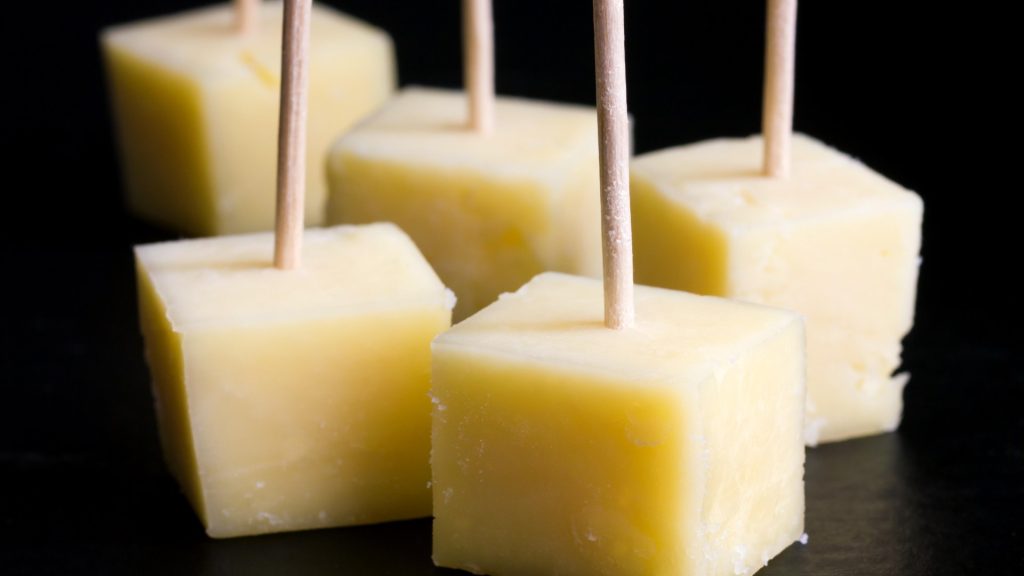MANY popular cheeses are packed full of “unnecessary” salt, campaigners have warned.
Action on Salt found that a 30g portion of standard supermarket cheddar contains more salt than a packet of crisps.

2

2
Asda’s 30% less fat mature British cheese had the highest salt studied, containing 2g of salt per 100g or 0.6g of salt per 30g.
Walkers Salt and Vinegar crisps contain 1.6g of salt per 100g, or 0.4g of salt per 25g multipack bag.
Cathedral City mature cheddar had 1.83g per 100g, while Morrisons’ cheese had the lowest average, 1.61g per 100g.
Adults are recommended to limit their salt to 6g per day (around one level teaspoon) to avoid health consequences including high blood pressure, which can lead to stroke and heart attack.
Most people do not weigh cheese before adding it to sandwiches, pasta or otherwise.
Given that salt is found in foods such as sausages, pizza, bread, soups and more, people may be consuming far more than they realise.
Sonia Pombo, of Action on Salt, said: “As a nation, we are all eating far too much salt, much of which is already added by the food industry in everyday family favourites such as cheese.
“The level of salt in some of these products is simply unnecessary.”
The charity’s survey of more than 600 cheeses found plant-based varieties were almost 10 per cent saltier than regular cheddar.
Graham MacGregor is a professor of cardiovascular medicine at Queen Mary University of London and the Action on Salt chairman.
He said: “Reducing salt is the most cost-effective measure to lower blood pressure and reduce the number of people suffering from strokes and heart disease and life-changing disabilities associated with this.
“According to the Department of Health & Social Care, each gram per day reduction in population salt intake saves more than 4,000 premature deaths per year.
“And yet, the government do little to help the public in reducing their salt intake and should force the food industry to use much less salt in their products.”
Maximum salt targets were set to be achieved by the end of 2024.
While many cheeses currently available fell below this level, the charity has called for even stricter and mandatory salt reduction targets beyond this year.
In 2012, the average salt content of cheese was 1.68g per 100g, compared to 1.7g per 100g in 2023.
The lack of any significant reductions since 2012 “makes it clear that the targets are far too lenient”, the campaigners said.
How to lower blood pressure
Persistent high blood pressure (hypertension) puts extra strain on your blood vessels, heart and other organs and it can raise your risk of serious conditions like heart disease, heart attacks and stroke. Here’s how to reduce it.
Reduce salt
Adults are recommended to limit their salt to 6g per day (around one level teaspoon) to avoid health consequences including high blood pressure.
The top tip is to swap out table salt, according to the Salt Substitute and Stroke Study, replacing it with a reduced sodium and added potassium alternative.
Cut down on alcohol
Excessive boozing can narrow the blood vessels, which raises the risk of hypertension.
Official drinking guidelines advise that people should not regularly drink more than 14 units a week to keep health risks from alcohol low.
Get moving
Exercise is good for the heart and the blood vessels.
Although the guidelines recommend 150 minutes of activity per week, if you’re currently very inactive, just a walk to the shop every day is better than nothing, and you can work up from there.
Studies suggest that isometric exercises – when you hold the body in one position without moving, such as a wall squat or plank – are best for lowering blood pressure.
Stop smoking
Smoking cigarettes is a killer. It makes the arteries sticky and narrow, which can cause blockages.
While smoking is not a direct cause of high blood pressure, it can cause an instant rise to pressure, heart rate and reduce the amount of oxygen that gets to the body’s cells.
Skip coffee
Sadly, caffeine can cause a short, but dramatic increase in your blood pressure – even if you don’t have high blood pressure.
Therefore cutting back on coffee is recommended as a lifestyle tip for those with hypertension.
Lose weight
The above tips can help you to lose weight, which is beneficial because being overweight in itself is a risk factor for hypertension.
Being overweight forces your heart to work harder to pump blood around your body, which can raise your blood pressure.
The only way of knowing whether you have high blood pressure is to have a blood pressure test. All adults over 40 years old are advised to have their blood pressure checked at least every five years.


